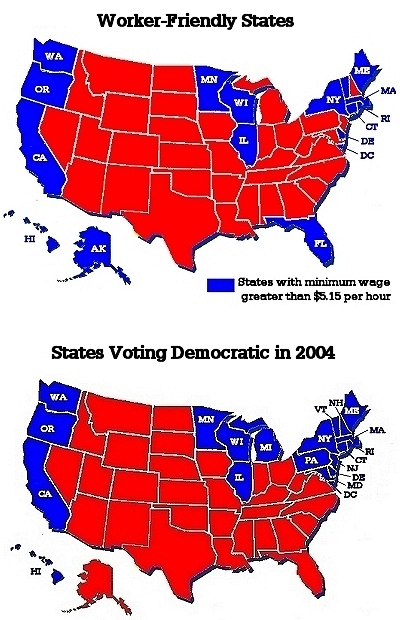The Blue and Red State Minimum Wage Divide
A quick trip to the U.S. Department of Labor web site got me to the data I sought: An exact look at what the minimum wage is in all states and, to really satisfy a hunch, a look at which states have enacted more family-friendly wage laws.
Sixteen states and the District of Columbia have minimum wages higher than the national level, with Washington and Oregon topping the scale at $7.35 and $7.25 per hour, respectively. Californians earn a minimum of $6.75 per hour while San Francisco – that proud bastion of liberalism – requires that employers pay at least $8.50 per hour.
Twenty-six states are the same as the federal level and two are below. Fortunately, Ohio with a lowly $4.25 per hour minimum and Kansas, with a scrooge-like $2.65 per hour rate, are superceded by the federal law. Six states have no minimum wage law, which make the federal $5.15 per hour the de facto standard.
Here are the states (and D.C.) that have set a minimum wage standard above $5.15 per hour:
- Alaska $7.15
- California $6.75 ($8.50 in San Francisco)
- Connecticut $7.10
- Delaware $6.15
- District of Columbia $6.60 ($7.00 on January 1)
- Florida $6.15
- Hawaii $6.25
- Illinois $6.50
- Maine $6.35
- Massachusetts $6.75
- Minnesota $6.15
- New York $6.00 ($6.75 on January 1)
- Oregon $7.25
- Rhode Island $6.75
- Vermont $7.00
- Washington $7.35
- Wisconsin $5.70

Of the parts of the United States making some effort to provide a working wage for our families, all but two of those states voted for John Kerry in 2004 and tend to vote Democratic in most national elections.
So what does this mean?
It means that these are primarily liberal-leaning states and an excellent example of why we should wear that label proudly going into the 2006 and 2008 election cycles. In doing better at defining ourselves – rather than letting Republicans misrepresent who we are – drawing these kinds of distinctions is central to our definition of what being liberal and Democratic means.
Votes like the one made by Senate Republicans on Wednesday (to kill a higher minimum wage) need to be hammered home as constant reminders of what their version of America looks like. States that care about the lot of working families need to be held up as examples of how Democrats envision our society.
We saw the true impact of poverty in the wake of Hurricane Katrina. Let's continue to drive home the reality of cruel conservative policies and the undeniable role that agenda plays in the world of working families.

















<< Home